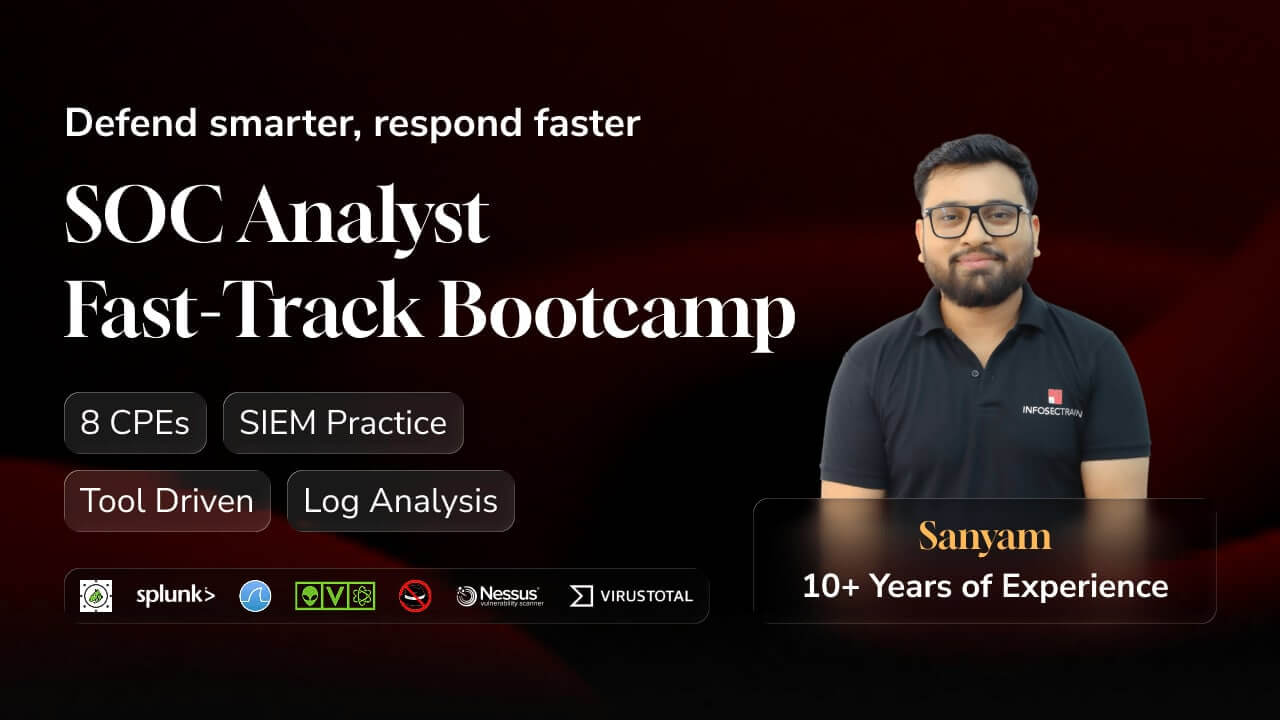Program Highlights
Computer Hacking Forensic Investigation (C|HFI) is a vendor-neutral training certification devised by the EC Council. The C|HFI certification program helps security professionals stay ahead of the curve with extensive knowledge of detecting and investigating cyberattacks and exploiting all crucial evidence to support the investigation reports. Our C|HFI certification training is a well-crafted course designed to provide you with a holistic learning experience of C|HFI and effectively train you to achieve this certification.
40-Hour Instructor-Led Training
Training Certificate
Learn with Real-World Scenarios
Highly Interactive and Dynamic Sessions
98% Exam Pass Rate
Learn from Industry Experts
Career Guidance and Mentorship
Extended Post Training Support
Access to Recorded Sessions
Training Schedule
- upcoming classes
- corporate training
- 1 on 1 training
Looking for a customized training?
REQUEST A BATCHWhy Choose Our Corporate Training Solution
- Upskill your team on the latest tech
- Highly customized solutions
- Free Training Needs Analysis
- Skill-specific training delivery
- Secure your organizations inside-out
Why Choose 1-on-1 Training
- Get personalized attention
- Customized content
- Learn at your dedicated hour
- Instant clarification of doubt
- Guaranteed to run
Can't Find a Suitable Schedule? Talk to Our Training Advisor!

Computer Hacking Forensic Investigator (C|HFI) certification validates the expertise of security professionals in comprehensive computer forensics, including reporting incidents of cyber attacks and hacking attempts in the courts of law. C|HFI certification provides an extensive understanding of diverse cyber forensic techniques, ultra-modern forensic tools, evidence collection, and other critical elements required to perform thorough forensic investigations of hacking incidents, all with practical, hands-on experience.
This training is meticulously designed to expertly train the professionals intending to advance their careers as Forensic Investigators and execute their security roles and responsibilities with greater expertise. It offers practical insights into diverse, robust methodologies for addressing digital forensics concerns in the organization, constituting core fundamentals of security incidents, including infrastructure analysis and tools and techniques to identify and capture legal evidence against hackers and intruders.
Module 1: Computer Forensics in Today’s World
- Fundamentals of Computer Forensics
- Cybercrimes and their Investigation Procedures
- Digital Evidence and eDiscovery
- Forensic Readiness
- Role of Various Processes and Technologies in Computer Forensics
- Roles and Responsibilities of a Forensic Investigator
- Challenges Faced in Investigating Cybercrimes
- Standards and Best Practices Related to Computer Forensics
- Laws and Legal Compliance in Computer Forensics
Module 2: Computer Forensic Investigation Process
- Forensic Investigation Process and its Importance
- First Response
- Pre-Investigation Phase
- Investigation Phase
- Post-Investigation Phase
Labs: Create a Hard Disk Image File for Forensics Investigation and Recover the Data
Module 3: Understanding Hard Disks and File Systems
- Disk Drives and their Characteristics
- Logical Structure of a Disk
- Booting Process of Windows, Linux, and mac Operating Systems
- File Systems of Windows, Linux, and mac Operating Systems
- File System Analysis
- Storage Systems
- Encoding Standards and Hex Editors
- Analyze Popular File Formats
Labs:
- Analyze File Systems of Linux and Windows Evidence Images and Recover the Deleted Files
- Analyze File Formats
Module 4: Data Acquisition and Duplication
- Data Acquisition
- eDiscovery
- Data Acquisition Methodology
- Preparing an Image File for Examination
Labs:
- Create a Forensic Image for Examination and Convert it into Various Supportive Formats for Data Acquisition
Module 5: Defeating Anti-Forensics Techniques
- Anti-Forensics Techniques
- Data Deletion and Recycle Bin Forensics
- File Carving Techniques and Ways to Recover Evidence from Deleted Partitions
- Password Cracking/Bypassing Techniques
- Steganography, Hidden Data in File System Structures, Trail Obfuscation, and File Extension Mismatch
- Techniques of Artifact Wiping, Overwritten Data/Metadata Detection, and Encryption
- Program Packers and Footprint Minimizing Techniques
Labs:
- Perform Solid-State Drive (SSD) File Carving on Windows and Linux File Systems
- Recover Lost/Deleted Partitions and their Contents
- Crack Passwords of Various Applications
- Detects Hidden Data Streams and Unpacks Program Packers
Module 6: Windows Forensics
- Windows Forensics
- Collect Volatile Information
- Collect Non-volatile Information
- Windows Memory Analysis
- Windows Registry Analysis
- Electron Application Analysis
- Web Browser Forensics
- Examine Windows Files and Metadata
- ShellBags, LNK Files, and Jump Lists
- Text-based Logs and Windows Event Logs
Labs:
- Acquire and Investigate RAM and Windows Registry Contents
- Examine Forensic Artifacts from Web Browsers
- Identify and Extract Forensic Evidence from Computers
Module 7: Linux and Mac Forensics
- Collect Volatile Information in Linux
- Collect Non-Volatile Information in Linux
- Linux Memory Forensics
- Mac Forensics
- Collect Volatile Information in Mac
- Collect Non-Volatile Information in Mac
- Mac Memory Forensics and Mac Forensics Tools
Labs:
- Perform Volatile and Non-volatile Data Acquisition on Linux and Mac Computers
- Perform Memory Forensics on a Linux Machine
Module 8: Network Forensics
- Network Forensics
- Event Correlation
- Indicators of Compromise (IoCs) from Network Logs
- Investigate Network Traffic
- Incident Detection and Examination
- Wireless Network Forensics
- Detect and Investigate Wireless Network Attacks
Labs:
- Identify and Investigate Network Attacks
- Analyze Network Traffic for Artifacts
Module 9: Malware Forensics
- Malware
- Malware Forensics
- Static Malware Analysis
- Analyze Suspicious Documents
- System Behavior Analysis
- Network Behavior Analysis
- Ransomware Analysis
Labs:
- Perform Static Malware Analysis
- Analyze a Suspicious PDF File and Microsoft Office Document
- Emotet Malware Analysis
Module 10: Investigating Web Attacks
- Web Application Forensics
- Internet Information Services (IIS) Logs
- Apache Web Server Logs
- Detect and Investigate Various Attacks on Web Applications
Labs:
- Identify and Investigate Web Application Attacks
Module 11: Dark Web Forensics
- Dark Web and Dark Web Forensics
- Identify the Traces of Tor Browser during Investigation
- Tor Browser Forensics
Labs:
- Detect Tor Browser Activity and Examine RAM Dumps to Discover Tor Browser Artifacts
Module 12: Cloud Forensics
- Cloud Computing
- Cloud Forensics
- Amazon Web Services (AWS) Fundamentals
- AWS Forensics
- Microsoft Azure Fundamentals
- Microsoft Azure Forensics
- Google Cloud Fundamentals
- Google Cloud Forensics
Labs:
- Forensic Acquisition and Examination of an Amazon EC2 Instance, Azure VM, and GCP VM
Module 13: Email and Social Media Forensics
- Email Basics
- Email Crime Investigation and its Steps
- U.S. Laws Against Email Crime
- Social Media Forensics
Labs:
- Investigate a Suspicious Email to Extract Forensic Evidence
Module 14: Mobile Forensics
- Mobile Device Forensics
- Android and iOS Architecture and Boot Process
- Mobile Forensics Process
- Investigate Cellular Network Data
- File System Acquisition
- Phone Locks, Rooting, and Jailbreaking of Mobile Devices
- Logical Acquisition on Mobile Devices
- Physical Acquisition of Mobile Devices
- Android and iOS Forensic Analysis
Labs:
- Examine an Android Image File and Carve Deleted Files
Module 15: IoT Forensics
- IoT Concepts
- IoT Devices Forensics
This course is ideal for:
- Incident Responder
- Cybercrime Investigator
- Cyber Defense Forensic Analyst
- Forensic Analyst
- Malware Analyst
- Security Consultant
- Chief Security Officer
- Information Technology Auditor
- Basic understanding of IT, cybersecurity, computer forensics, and incident response.
- It is recommended to have CEH training and certification.
| Name of the Certification | C|HFI |
| Exam Code | 312-49 |
| Exam Format | Multiple Choice Questions |
| Exam Duration | 240 Minutes |
| No. of Questions | 150 Questions |
| Passing Score | 60-85% |
- Understand the fundamentals of digital forensics and cybercrime investigation techniques.
- Master anti-forensics techniques and methods to counteract them.
- Develop malware analysis and network forensics skills to detect and investigate cyber threats.
- Gain expertise in mobile forensics for comprehensive investigations.
- Perform forensic investigations on Windows, Linux, and macOS environments, including memory analysis and file system examination.
- Develop expertise in investigating dark web activities and social media forensics.
- Learn how to analyze web application attacks and investigate email crimes.
- Learn the fundamentals of cloud and IoT forensics.
- Prepare for real-world forensic challenges through hands-on labs and practical scenarios.
How We Help You Succeed
Vision
Goal
Skill-Building
Mentoring
Direction
Support
Success

Career Transformation
New digital forensic analyst roles are projected due to the growing demand for evidence collection and cybercrime investigation expertise.
Companies with C|HFI-certified professionals see better cybercrime investigations and evidence handling.
of Organizations: Plan to hire C|HFI-certified professionals to strengthen their forensic investigation teams and capabilities.
of Organizations: Investing in C|HFI training to improve digital forensics, malware analysis, and incident response proficiency.
Education
Healthcare
Retail
Government
Manufacturing
Finance


Our Expert Course Advisors

10+ Years of Experience
Words Have Power

It was a very good experience with the team. The class was clear and understandable, and it benefited me in learning all the concepts and gaining valuable knowledge.

I loved the overall training! Trainer is very knowledgeable, had clear understanding of all the topics covered. Loved the way he pays attention to details.

I had a great experience with the team. The training advisor was very supportive, and the trainer explained the concepts clearly and effectively. The program was well-structured and has definitely enhanced my skills in AI. Thank you for a wonderful learning experience.

The class was really good. The instructor gave us confidence and delivered the content in an impactful and easy-to-understand manner.
The program helped me understand several areas I was unfamiliar with. The instructor was exceptionally skilled and confident in delivering content.
The program was well-structured and easy to follow. The instructor’s use of real-life AI examples made it easier to connect with and understand the concepts.
Success Speaks Volumes
Get a Sample Certificate

Frequently Asked Questions
What is the Computer Hacking Forensic Investigator (C|HFI) certification?
The C|HFI certification validates expertise in computer forensics, focusing on identifying, analyzing, and reporting cybercrimes and hacking incidents. It equips professionals with skills to investigate digital evidence and support legal proceedings.
Who should enroll in C|HFI training?
This course is ideal for:
- Incident Responder
- Cybercrime Investigator
- Cyber Defense Forensic Analyst
- Forensic Analyst
- Malware Analyst
- Security Consultant
- Chief Security Officer
- Information Technology Auditor
What are the prerequisites for C|HFI certification training?
- Basic understanding of IT, cybersecurity, computer forensics, and incident response.
- It is recommended to have CEH training and certification.
How can the C|HFI certification benefit my career?
Benefits of C|HFI certification:
- Enhance expertise in digital forensics
- Increase job opportunities in cybersecurity
- Validate skills in cybercrime investigation
- Boost credibility with employers
- Prepare for roles in law enforcement and corporate security
What topics are covered in the Computer Hacking Forensic Investigator training?
The C|HFI covers various topics, including computer forensics, digital forensics, cybercrime investigation, data acquisition, malware forensics, network forensics, cloud forensics, mobile forensics, email and social media forensics, and others.
How long does it take to complete the C|HFI certification training?
The C|HFI certification training typically takes 5 days (40 Hour) to complete if taken as an instructor-led course.
What are the key features of the C|HFI V11 training at InfosecTrain?
The key features of the C|HFI V11 Training at InfosecTrain include:
- Expert instructors
- Flexible learning
- Comprehensive curriculum
- Hands-on labs
- Certification preparation
- Post-training support
- Industry-relevant skills
Is the C|HFI certification recognized internationally?
Yes, the C|HFI certification is recognized internationally, validating expertise in digital forensics and cyber investigation across various industries worldwide.
How do I prepare for the Computer Hacking Forensic Investigator exam?
To prepare for the C|HFI exam, follow these steps:
- Review the official C|HFI study guide and additional resources
- Study the course materials thoroughly
- Enroll in the C|HFI certification training course provided by InfosecTrain
- Attend live or recorded sessions to gain in-depth knowledge
- Participate in hands-on labs and practical exercises
- Use practice exams and quizzes to evaluate your understanding
- Seek guidance from InfosecTrain mentors for any doubts or clarifications
- Join study groups or forums to discuss topics and share insights
What support does InfosecTrain offer during the C|HFI certification training?
InfosecTrain offers:
- Expert guidance
- Comprehensive study materials
- Hands-on labs
- Practice tests
- 24/7 support




